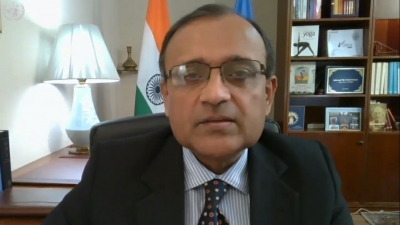“Those who advocate that both sides need to stop fighting, do you also mix salt and sugar in your food? This is a war between evil and good, there is no neutrality. You either support the evil or want the good to prevail,” says Atta Nasib, head of the Afghanistan Investment Facilitation Unit as fierce battles raged between the Afghan army and the Taliban across Afghanistan—a pivotal state in the heart of the Hindukush mountains.
Similar sentiments, rich and powerful, echoed in the emergency special session on Afghanistan in the United Nation Security Council (UNSC) marshalled under India’s presidency on Thursday.
This extraordinary meeting was called at the request of Afghanistan’s Foreign Minister, Mohammad Haneef Atmar on the rapidly deteriorating security situation in his country. In the meeting, members were cautioned that time was running out to prevent ‘worst case scenario’ arising in Afghanistan. Most of the members of the 15 permanent and non-permanent members of the UNSC slammed Taliban and its supporter Pakistan for the seething violence and massive human rights violations in Afghanistan.
India urged the UNSC that the time had arrived for it to “decide on actions” to convey an everlasting and complete ceasefire and guarantee a direct cessation of violence in Afghanistan, which, it warned, posed a “serious threat” to regional peace and security.
Also read: Afghans chant “Allahu Akbar” as slogan of defiance against Taliban incursions
“It is, therefore, time for the international community and, in particular, this Council to take stock of the situation, and decide on actions that would help bring a permanent and comprehensive ceasefire and ensure an immediate cessation of violence,” asserted TS Tirumurti, India’s envoy to the UN.
“For enduring peace in Afghanistan, terrorist safe havens and sanctuaries in the region must be dismantled immediately and terrorist supply chains disrupted,” the Indian envoy added.
The Afghan representative to the UN, Ghulam M, Isaczai, launching a direct attack on Pakistan, said that Afghanistan is prepared to provide the UNSC with material evidence in support of its claim that Pakistan was responsible for establishing a supply chain of war material to the Taliban.
“Importantly, the Taliban continue to enjoy a safe haven in and supply and logistics line extended to their war machine from Pakistan. Graphic reports and video of Taliban fighters congregating close to the Durand Line to enter Afghanistan, fund-raising events, transfer of dead bodies for mass burial and treatment of injured Taliban in Pakistani hospitals are emerging and are widely available,” Isaczai added. “Should members of the Security Council want that evidence, we are ready to provide them,” the envoy said in his compelling statement.
He also added that since mid-April, Taliban and their affiliated foreign terrorist groups launched over 5,500 attacks in 31 provinces, with the direct support of over 10,000 foreign fighters of 20 groups, including Al-Qaeda, LeT, TTP, ISIL who entered Afghanistan & were fighting alongside Taliban. The Afghan envoy cautioned the Central Asian countries that there was evidence that the East Turkestan Islamic Movement (ETIM) and the Islamic Movement of Uzbekistan (IMU), which have pledged allegiance to ISIL, fought alongside the Taliban in Faryab, Jowzjan, Takhar and Badakhshan provinces where they are currently present with their families under the Taliban control. No more evidence is required to establish Taliban’s hand-in-glove linkages with international terror.
“The link between the Taliban and these transnational terrorist groups is stronger today than at any point in recent times,” he warned the UNSC.
Deborah Lyons, Special Representative of UN Secretary-General for Afghanistan summed up the session by warning that Afghanistan is a point of inflection. “Afghanistan is at a dangerous turning point. In the past weeks, Afghanistan has entered a new destructive phase. Taliban has achieved significant territorial gains,” she observed.
Lyons pointed out that international community is faced with a choice between genuine peace negotiations or a tragic set of crises resulting from an increasingly brutal conflict. The fallout would mean acute humanitarian situations and multiplying human rights abuses, with a potential spill over of the crisis beyond Afghanistan’s borders. She urged ambassadors to seize the opportunity and demonstrate commitment “to prevent Afghanistan from descending into a situation of catastrophe so serious that it would have few, if any, parallels this century.”




















